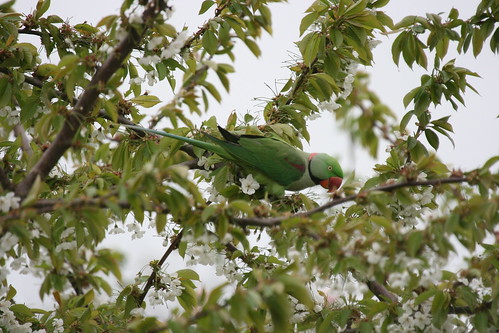 Alexandrine Parakeet (Psittacula eupatria) In the Wild in AmsterdamOn March 23, near Memco crossroads, police found 100 adult Alexandrine Parakeets and 60 chicks brutally stuffed inside two cages, meant to be sold to customers. Luckily, police freed them from captivity in time.
Alexandrine Parakeet (Psittacula eupatria) In the Wild in AmsterdamOn March 23, near Memco crossroads, police found 100 adult Alexandrine Parakeets and 60 chicks brutally stuffed inside two cages, meant to be sold to customers. Luckily, police freed them from captivity in time.
On April 3, Shahpur police caught two persons, one of them a woman, with 30 birds near Delhi Chakla area. These birds included 10 Australian Budgerigars or lovebirds and 20 Indian Ring Necked Parrots, meant for sale.
These two recent horrific incidents are evidence that the age-old bird trade in the city is still very active. Though local police along with forest officials are conducting raids to free birds from the clutches of traders, their efforts are not proving sufficient.
While the trade of Indian birds is illegal, that of exotic birds in the city does not come under the purview of the Wildlife Protection Act because of their foreign origin. Says Dr RK Sahu, superintendent of Kankaria Zoo, "However, if you put exotic birds in cramped cages or don't give them food or water, you can be booked under Prevention of Cruelty to Animals Act. For all kinds of Indian birds, both laws apply. Thus it's better not to buy or keep birds."
People must understand that birds are meant to soar in the open sky. They are not showpieces to be kept in cages for the amusement of kids or guests.
Moreover, environmentalists fear that such rampant trade of birds is resulting in drastic drop of parakeet population, both in forests as well as in cities. Alexandrine Parakeets aka Rajpipla Parrots, found in the Shoolpaneshwar Wildlife Sanctuary in Narmada district, are the worst hit, as they are most popular among customers probably due to theirmimicking ability.
"According to the law, no one can keep such birds in confinement. But, due to ignorance people are doing so," assertedKandarp Kathju, a city-based naturalist, who believes that due to the illegal trade of Alexandrine Parakeets, their population in the wild is gradually decreasing.
According to experts involved in saving indigenous birds, the main hub of illegal bird trade in the city is Delhi Chakla area. On the road near RC High School, anyone can spot cage makers selling empty cages for birds on the footpath.
If someone approaches them asking for birds, they might hesitate and deny selling birds, only cages. However, once they get comfortable with the customer, the vendors will take him inside the narrow lanes of Delhi Chakla, where they have kept various Indian as well as exotic birds, hidden inside covered cages.
According to Rag Patel, trustee, Nature Conservation Foundation (Gujarat), there are many loopholes in the system, which is helping such a trade flourish despite there being laws to protect them. He also alleged that pet shops have started selling birds illegally.